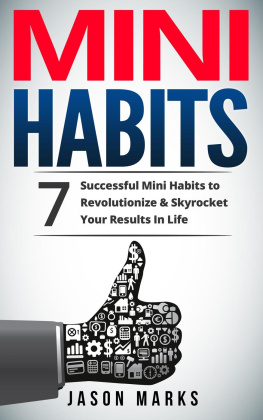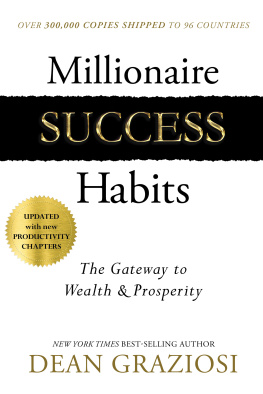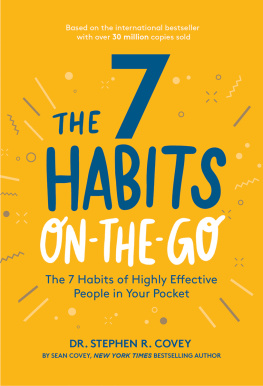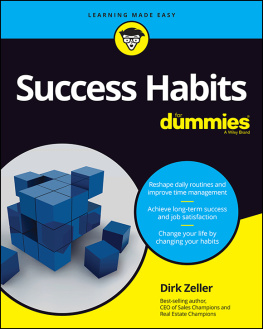
Published by Jaico Publishing House
A-2 Jash Chambers, 7-A Sir Phirozshah Mehta Road
Fort, Mumbai - 400 001
www.Jaicobooks.com
2020 Steven Schuster
Published in arrangement with
Steven Schuster through
TLL Literary Agency
tll@tllenterprise.com
www.tllenterprise.com
To be sold only in India, Bangladesh, Bhutan,
Pakistan, Nepal, Sri Lanka and the Maldives.
HABITS OF A MILLIONAIRE MIND
ISBN 978-93-89305-85-2
First Jaico Impression: 2022
No part of this book may be reproduced or utilized in
any form or by any means, electronic or
mechanical including photocopying, recording or by any
information storage and retrieval system,
without permission in writing from the publishers.
CONTENTS
Introduction
If you look at any bookstore in the self-help section, the word habits is going to jump out time and time again. If you are walking down the street, you will see plenty of billboards talking about overcoming your habits, your addictions, and your shortcomings. Different strategies to change your habits or break them completely bombard us day after day.
So, what is a habit? You probably think thats a funny question to even ask. Of course you know what a habit is! Its something you keep on doing, right? The dictionary definition of habit is: a settled or regular tendency or practice, especially one that is hard to give up. It is something you keep on doing, and you dont even think about it.
Theres the key right there. Habits require little to no thinking before you do them. Actually, thoughts do go into your habits, but it all happens in your subconscious. Your habits are an automatic response to the cues that happen throughout your day. Certain situations, people, and things you see on a daily basis elicit a response in your mind that makes the habit happen.
Charles Duhigg in his book The Power of Habit talks about numerous studies on how habits are formed and maintained. Based on Duhiggs book, the formation of habits can be broken down into three different parts. An environmental cue leads to a behavioral response, and then a reward.
CUE BEHAVIOR REWARD
For example, lets say you bite your nails. Millions of people bite their nails. It is a habit that is extremely hard to get rid of. In fact, there are even substances you can paint onto your nails to make them taste bad in hopes youll stop biting them. But why do so many people bite their nails? The problem is that people dont fight the right enemy. The enemy is not nail-biting itself, but the trigger elicited by a cue that you associate with biting your nails.
This could be your boss calling you into a meeting unexpectedly, a long night of boredom from studying, or maybe your nails just grew a little more and its time for you to bite them. These cues trigger your minds desire to perform the behavior. When you start biting your nails, your brain relaxes a little and you feel better by performing the habit.
In order to break this habit or form new habits, you need to focus on the cues instead of the behavior.
Most of us try to focus on the habit itself. For example, you want to start cooking dinner instead of eating out every night, so instead of focusing on just making your dinner, you need to focus on creating a routine leading up to cooking dinner. This small difference is enough of a difference in your mind that you start to develop the habit.
One way to help yourself develop new habits is to choose an easy cue to start with. Maybe the cue is getting home from work and feeling hungry. Right when you get home from work, focus on the routine that will develop your habit of cooking dinner. When you get home, pull out the ingredients you need to cook dinner. If the ingredients are already out by the time you get out of your work clothes and do anything else you need to do, youre going to cook.
Day after day, continue this same routine. Youll notice soon that you dont have to think about going to the fridge and pulling out ingredients it will just happen. This is your habitual response to your environmental cue of getting home from work.
The reward of cooking the dinner, on one hand, is the delicious and healthy meal that you get to eat once you finish cooking. But on the other hand, you can keep at home some dessert like your favorite ice cream to reinforce the target behavior after youve completed it. Home-cooked meals are delicious, and you may find yourself looking forward to getting new recipes and cooking up something new.
When there is something in your life that you want to change, habits can help you to get there. The creation of new habits can be applied to your personal life to ensure that you have a better life of your making. Throughout this book, I will outline the different habits that highly successful people have so that you can create a better financial and personal life.
These new habits will help you change your daily routine and set you up for success. Its a long path to walk, but each day youre taking action, youll become better than the day before.
Endnotes
Duhigg, Charles. The Power Of Habit. Cornerstone Digital. 2012.
shared_access_token=1t3KgjzTh7pNlTbKiFeGeve4RwlQNchNByi7wbcMAY5AyXY818SLPa3uGSQOp-H39rZHtxCnFbwns2PYqDYgf6BwMwP8Tf8UPqmSBowGTc-FbG5g4Xo-R9oL4XzkMjWYoeH8lxBnPvlNXH01uHEfMZlhTZwqWAJciso7kM9Zc%3D
Carnegie, Dale. How to win friends and influence people? Ebury Digital; New Ed edition. 2010.
Chapter 1: Willpower
Have you ever heard of the marshmallow experiment? It sounds like something Id definitely want to be a part of. Marshmallows? Yum! But on a more serious note, in 1972, psychologist Walter Mischel conducted an experiment with children and marshmallows.
One by one, he called the children in the room where the experiment took place and gave them a single marshmallow. After dispensing the sweets, he said he had to leave for a little while. Before leaving the room, he told the children if they waited to his return to eat the marshmallow, he would give them an additional marshmallow when he got back.
The results were the following: one-third of the children ate the marshmallow right when Mischel left. Another third waited for a little while, but then ate the marshmallow anyway.
The last third waited the fifteen minutes it took for Mischel to get back and were rewarded with another marshmallow.
Mischel was interested to see if a childs age correlated with their ability to delay gratification. Based on his experiment, he concluded that older children could wait longer before eating the marshmallow.
Twenty years after this experiment, Mischel tracked down the now grown up children to see if the ones who didnt delay gratification (immediately ate the marshmallow) were less successful than the ones who did delay gratification (waited for Mischel to get back).
Mischel found that the childs ability to delay gratification had a strong connection with their success later in life. The correlation was greater than almost any other measure including intelligence, test scores, income, religion, personality type, and gender. Psychologists continued to revisit and replicate this study to find that individuals who are able to delay gratification longer were physically healthier, more successful academically, financially more stable, and had a better quality of life.
Even though these findings have been proven time and time again, the ability to delay gratification and hold greater willpower seems to be at an all-time low in our society. More people are obese and in debt, consumed by narcissism and mental disorders, and our attention spans are shrinking. So whats going on?
Next page







